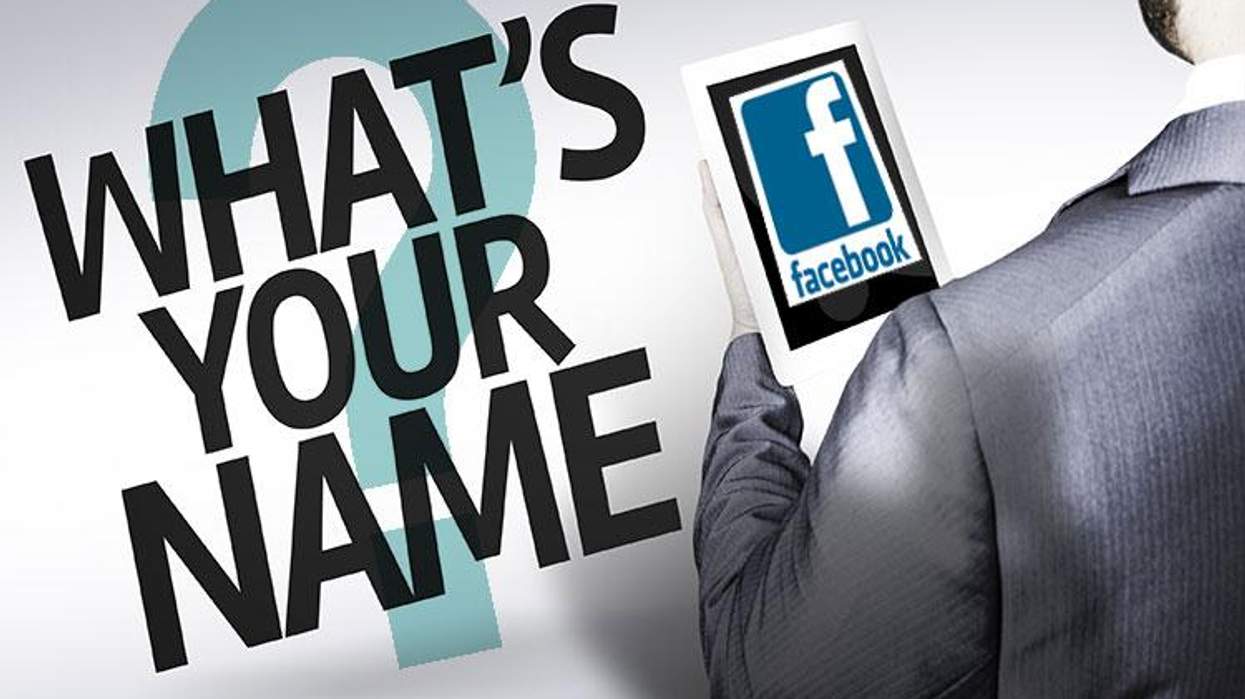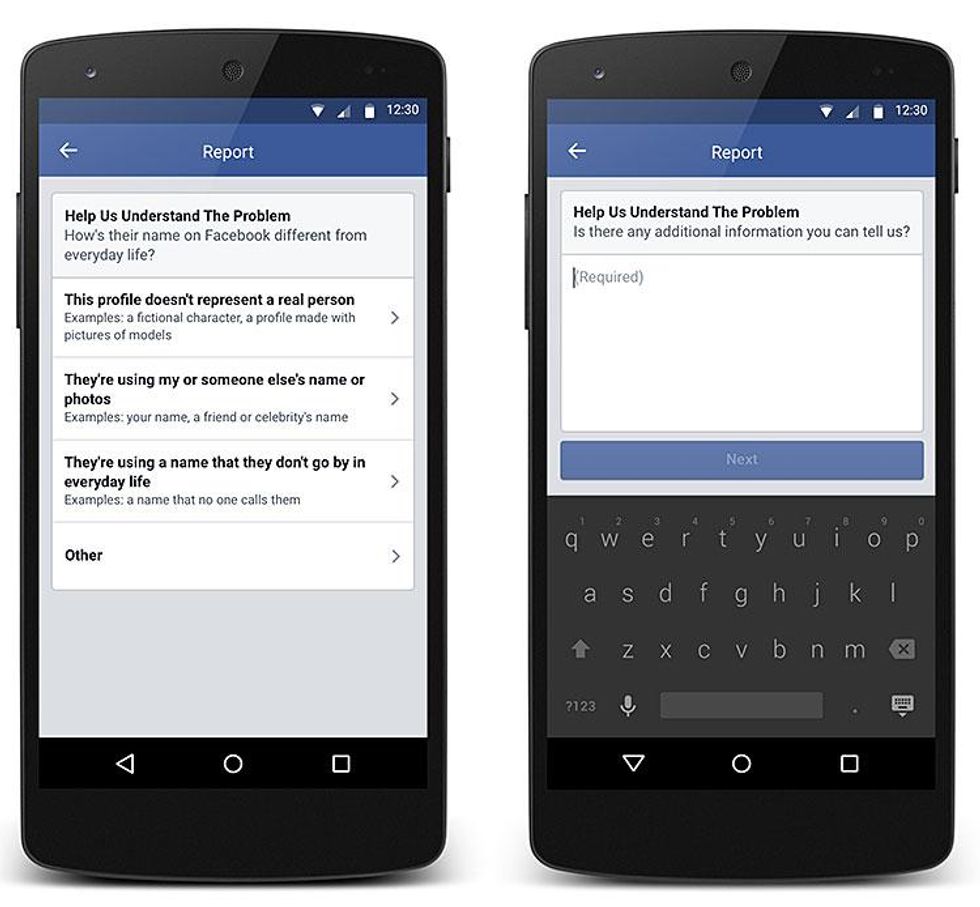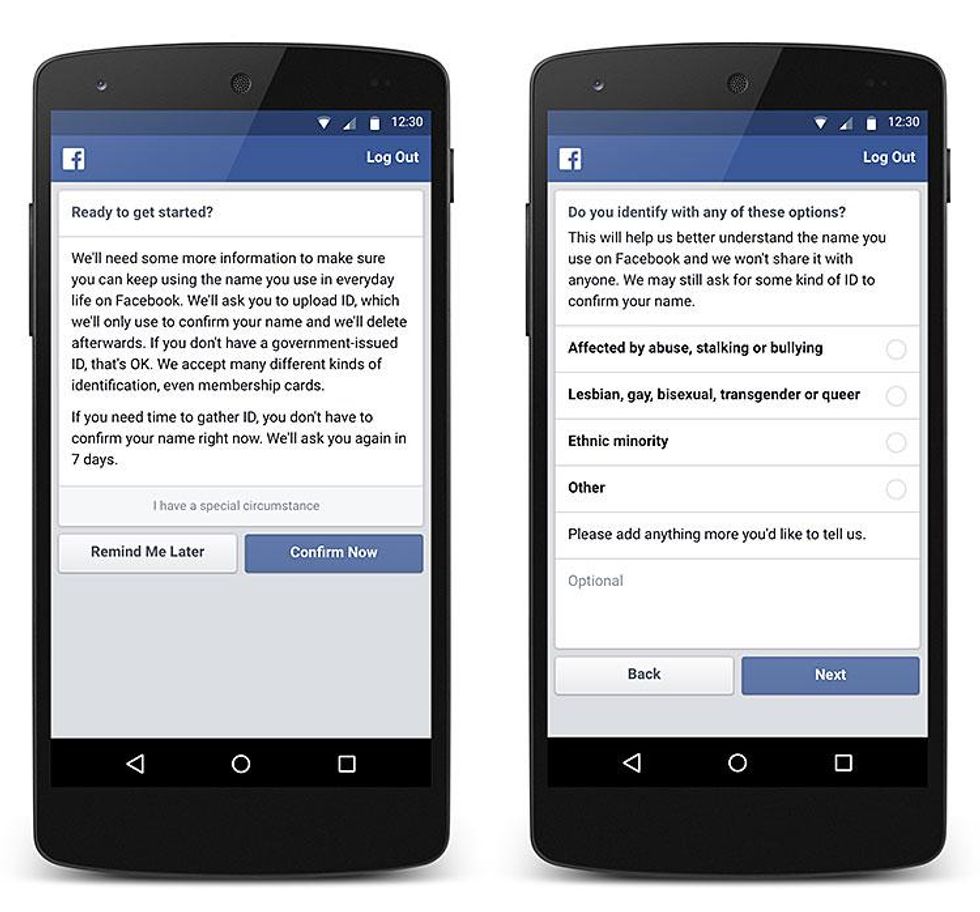The next time you go to Facebook and are asked "What's on your mind?" Facebook may choose you for a special test designed to improve the user experience -- especially for transgender people, drag performers, and Native Americans.
"Today, we will begin to test new tools," wrote Justin Osofsky, vice president of global operations, and Todd Gage, a Facebook product manager who worked closely on these changes, in an online statement.
The test, designed to improve the way Facebook enforces its policy on "real" names, was announced last month, the latest effort in the company's long struggle to address criticism that its rules erase the identities of those with nonlegal chosen names that more accurately reflect their identities. On Friday, Facebook invited The Advocate to a one-on-one video chat to tour the experience being rolled out, walking us through what users selected for the test will experience.
Not surprisingly, the folks at Facebook wouldn't reveal how many users would take part, other than "a percentage," nor for how long the test will last, except to say it gets under way today at 10 a.m. Pacific.
As he did last month, Facebook spokesman William Nevius told The Advocate that executives at the social network recognize that the number of people being asked to verify their name needs to be reduced, and that those users asked to confirm their name be able to do so more easily.
But the controversial name policy -- which has led to protests, summits, a Kickstarter campaign and many complaints which were largely posted on, where else, Facebook -- remains.
"We're firmly committed to this policy, and it is not changing," said Osofsky and Gage. "After hearing feedback from our community, we recognize that it's also important that this policy works for everyone, especially for communities who are marginalized or face discrimination."
The move won some praise. "By taking important steps to improve its name policy, Facebook is once again demonstrating a strong commitment to inclusion and respect for LGBT users," said GLAAD CEO and president Sarah Kate Ellis.
"This is a solid step toward greater inclusion for Facebook users who are transgender and targeted online," said Jay Brown, director of research and public education at the Human Rights Campaign, in a statement provided to The Advocate via Facebook. "We must work to ensure each user can be themselves authentically on Facebook, even when access to documents reflecting that identity is limited or impossible."
Starting today, both mobile and desktop users in the United States will be selected for the test and will experience the following changes, or "improvements," as Facebook insists on calling them: the so-called "fake name" reporting process, the name verification process, specialized support, and the name confirmation process.
So although Facebook maintains this is not a change in its name policy, within this test it will accept a wider variety of options than before.
Name Reporting
Facebook changed the language to reflect that names sometimes aren't legal but are the names by which some people are known best.
There's an expanded list of options to report names that many consider their real monikers, including many Native Americans, transgender people, and drag performers. Starting with the image below and on the left, the first choice addresses the growing problem of multiple profiles that are created for criminal or abusive purposes, by scammers or imposters, and names that don't reflect a decision by an individual to create a new identity. There is also a choice for "other" should these categories not fit the complaint. And those reporting a user profile are asked to provide more than just a click but make their case as to why they feel it necessary to report someone's profile, as seen on the bottom right.
This, Facebook project leaders say, will help them better understand the motive behind the report and steer users to the right resource.
And while Facebook assures its users all reporting is anonymous and that offenders won't ever be told it is who reported them, the company of course does know and keeps that information confidential.
Name Verification
The screen on the left, below, shows what test users will see if the name they use on Facebook is challenged. They will have seven days to respond before their account is reviewed for closure, and there are alternative options now, such as a "special circumstance" and the option to be reminded later to take time to address this, without losing connectivity on the network.
The screen below left offers a look at the "special circumstances," which includes victims of abuse, stalking, bullying, LGBT users as well as those who simply identity as "queer," and ethnic minorities.
What about intersex individuals or other categories not included here? we asked. For that, at present, is the "Other" button as well as an interface that allows users to add additional information. These options, says Facebook, will help the company learn and refine the process.
Those involved in the test told The Advocate many users were reporting names when what they were trying to do was report behavior they found objectionable. A new interface allows users to identify behavior.
Specialized Support
Facebook's mathematical and coding experts are considering implementing a new algorithm to separate false reports from the real deal, and those in the know told The Advocate one way the system would be able to "see" if the name you use is how you're known, is by checking your birthday, So if your legal name is Christopher but many of your friends post "Happy Birthday, Kit!" on your wall, the systems could someday recognize that you are indeed known by "Kit" as well as the name your mom and dad gave you. For now, Facebook says this is just an idea that is still in the works.
After the automated checks are done, humans get their hands dirty. Acknowledging that previously the messages sent by Facebook to alert a user about their name were "archaic, even robotic," the company told The Advocate that its most experienced techs, with the longest tenure in dealing with names issues, will be on the case. They will review the reports screened by the computers, looking at both the user in question and who reported them, and deciding which ones are worthy of further investigation and which ones are just sent by troublemakers.
This process, Facebook said, is the result of many conversations with what it called community stakeholders, including the LGBT community.
"As a member of the Network of Support, PFLAG National has provided feedback on Facebook's work improving its authentic name process for more than a year," said Liz Owen, director of communications for PFLAG National. "Throughout this time, Facebook has shown a strong commitment to hearing and incorporating feedback, and making improvements to the policy and the process of its implementation. These latest improvements are a great step forward on this front."
Name Confirmation
This is where users have an opportunity to make their case for their chosen name. There's now a seven-day process that maintains users's access to their accounts and apps and social posts while they decide how to best respond.
"We expanded the options and documents that everyone on Facebook can use to verify their name," Gage and Osofsky wrote in their open letter posted on Facebook. "We also implemented additional security protections for documents that people share with us when they are verifying their name.
According to Facebook, this is just the beginning of its improvements. In the first few weeks of 2016, Facebook is promising to reduce the number of users forced to endure an identification verification experience, all the while allowing users to like, share, scroll, comment, post, and check in without fear. The goal, the company said, is to keep "the Facebook community safe, supported and connected."
Click here to read Facebook's message to users about its test, beginning at 10 a.m. Pacific.

















Charlie Kirk DID say stoning gay people was the 'perfect law' — and these other heinous quotes
These are some of his worst comments about LGBTQ+ people made by Charlie Kirk.